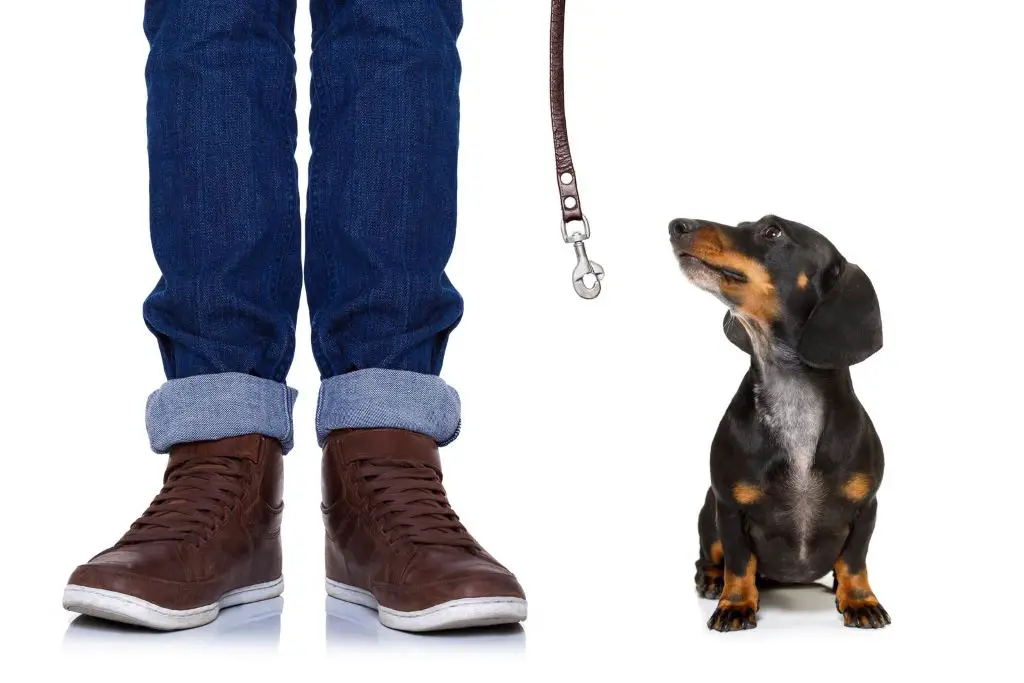Dachshunds are known as one of the most popular breeds in America. These small dogs have long bodies that make them prone to back problems, but it’s important not to let your dog become overweight or obese since this can cause even more issues with their posture and movement!
Make sure you know what weight range they should reside within, so we don’t end up causing any pain for our pup–it’ll be worth all those vet bills later down the line.
What is a healthy weight for a dachshund: What do pet experts say?
Pet experts say that we must take into consideration the fact that dachshunds come in three different short-haired types: standard, miniature, and rabbit. While they do have many similar characteristics like their elongated bodies and long, low frame (which makes them prone to spines issues), these breeds range from 11-16 inches high and weigh anywhere from 13-32 pounds.
This means that a normally proportioned doxie should have a waistline without any signs of obesity, but there’s also a difference between overweight and obese animal. A dachshund who is slightly heavier because they have larger bones or more muscle mass for their body frame will still be able to function and live a normal life–they may just have some difficulty getting up or moving around after periods of rest or sleep.
An obese dachshund will be so overweight that it’s putting strain on their joints and internal organs, and this can happen within just one year and without proper dieting and exercise! Therefore, it’s important to take your Dachshund to the vet for a thorough checkup and know what kind of diet they should be on–there are specially made diets that can help.
What is overweight for a Dachshund?
So, what is overweight for a dachshund? Well, if your doxie has a waistline that’s big enough to see the outline of their rib cage easily, or you can feel their ribs daily, then they’re too skinny and need to gain some weight.
However, if you notice an increase in weight around your pet’s belly, hips, or butt area, even if they’re not showing any signs of being able to have ribs felt, then your doxie is obese.
What is an underweight dachshund?
A dachshund who falls into this category will be so skinny that you can see their pelvic bones poking out and possibly even feel their spine if you lightly run your fingers over their hips and back. If you can feel bones such as these, then chances are your pup is too thin and should be fed more often. An ideal weight range for an underweight doxie is 17 pounds, though some breeds may weigh more or less than others.
How much should a medium-sized Dachshund weigh?
This short-haired breed of Dachshund can weigh anywhere from 13-32 pounds, though the leaner and more muscular among them will fall on the lower end of this weight range while overweight dachshunds will be closer to 32 pounds.
How heavy should my miniature Dachshund be?
If your pet falls into this breed category, then the scale will tell you that they can weigh anywhere from 11-16 pounds though there are some within this range who are shorter or taller. The ideal weight for a miniature dachshund will be between 13 and 15 pounds.
Tips On Maintaining Your Dog’s Healthy Weight
If your Dachshund has gained a few pounds because you might have been overfeeding them or giving them table scraps, don’t fret. All you need to do is change their diet up a bit by feeding them smaller portions of high-quality food that will help them lose weight gradually. Feeding your pet reduced-calorie dog foods will ideally help them lose weight within one to two months.
Other ways you can help maintain your doxie’s healthy weight include restricting their food intake after 8 pm, feeding them nutritious snacks like carrots, green beans, or apples between meals, and trying some light exercise with them before bedtime. Play fetch in the yard or go for a walk around the block to burn a few calories and help your pet slim down.
If you’re worried that your Dachshund is overweight, take them to the vet for a checkup and let them know about your concerns. If they indeed are too heavy, then ask if there’s a specific weight range they should be in depending on their age and breed type. Dieting or altered feeding schedules may be recommended, so try not to be scared off by this advice. Just remember that obesity can cause serious health problems for our pets, so taking them to the vet for a checkup every 6 months is one of the best ways to monitor their health and weight.
FAQs
How big will my Dachshund get?
A full-grown medium or large Dachshund will be somewhere between 13-18 inches tall, while miniatures are typically 6-11 inches tall.
How much should I feed my Dachshund?
If you have a small to medium-sized doxie, then they should eat around 4 cups of food in each 24-hour period. But remember, this is based on their ideal weight range and not how much they weigh. Your pet will need more food if they’re overweight and less if they’re underweight.
Can my Dachshund go on a diet?
Yes, if your pet is overweight, then you will need to go on an altered feeding schedule with them. This may include switching food brands or cutting down their daily intake so they can slim down gradually without losing too much weight too quickly. Consult with your vet about how much food is enough for your pet so they can maintain their ideal weight.
Conclusion
Again, you are the final judge of how much food your pet should or shouldn’t have. If they’re starting to gain a bit of weight, then try altering their diet and schedule by cutting down meal portions and exercising them more often.
And if your Dachshund is already overweight, then talk to your vet about what kind of changes you can make to their diet and feeding schedule. Remember, not all weight gain is caused by overfeeding and table scraps, so make sure you do your research before altering your pet’s food intake. Good luck!








